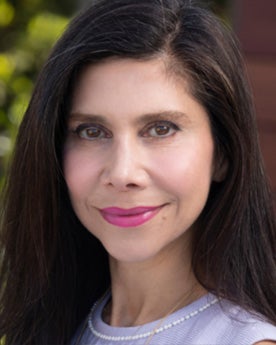One of the great advantages of UCLA Anderson is its connections to the greater UCLA campus, where entrepreneurial students tap the resources of other professional schools, the UCLA Health system and the joint interdisciplinary initiative UCLA Biodesign, which promotes leadership and entrepreneurship in health care technology. With Vitals, the annual conference of Anderson’s student-led Healthcare Business Association, that collaboration extends far beyond the university into industry and communities.
The 2022 Vitals conference convened under the theme Solutions for All: The Path to Health Care Equity. It was anchored at one end by the keynote address by Dr. Medell Briggs-Malonson (B.S. ’01, MSHS ’11), of the David Geffen School of Medicine at UCLA, about ground-level community involvement in better health outcomes; and, at the other, the heady topic of genomic sequencing and its applications for more equitable access to health care globally, as explained by Susan Tousi (’05), chief commercial officer at Illumina. In between, entrepreneur Mariya Filipova, an XPRIZE winner and former VP of innovation at Anthem Inc., engaged Rajeev Ronanki in a fireside chat. Ronanki is president of digital platforms at Anthem and author of You and AI: A Citizen’s Guide to AI, Blockchain, and Puzzling Together the Future of Healthcare (ForbesBooks, 2021).
Throughout the full-day event, the thread connecting every conversation was the intensifying dynamic between humans and technology. How can tech — from AI in personalized medicine to non-invasive surgical procedures to machine learning designed to eliminate bias — deliver opportunities for better, more equitable health outcomes? Who is benefitting from rapid advancements and who might be getting left behind? And, perhaps most crucial for the student audience, what kinds of jobs and responsibilities might MBAs pursue on the business side of health and technology? Governing each response to these questions was the consensus that the crucial role ethics play cannot be minimized.

Briggs-Malonson is chief of health equity, diversity and inclusion for the UCLA Hospital and clinic system and an associate professor of emergency medicine. A self-described “warrior for health equity,” Briggs-Malonson is the first physician from a family of nurses and helped build the Martin Luther King, Jr., Community Hospital in South L.A. She took an early interest in how populations are served or, in too many cases, underserved. She specialized in emergency medicine because it’s a great equalizer, where everyone is taken care of equitably. Invoking the maxim that your ZIP code matters more than your genetic code in determining your health, she said, “The quality of care one receives tends to be a significant indication of overall outcomes.”
But non-medical factors are, on the whole, the greatest contributors to poor health. Briggs-Malonson focuses on the “social-structural drivers of health” like economic stability, education, neighborhood, physical environment, food, health care access and, indeed, technology that affect poor people and people of color in disproportionately negative ways. “We’re 99.9% the same, genetically,” she said. “Race and ethnicity are constructs that impede equality, equity and justice. Racism raises the physiologic stress response. You can see how people subjected to discrimination have higher rates of heart disease and other health conditions.”
Briggs-Malonson believes that, through technology, “what we can do to improve equity is limitless.” Her work in the field includes the medically equipped mobile units of UCLA Health’s Homeless Health Care Collaborative as a way to serve people where they live, even in an encampment or shelter. The vans enable careful data collection and metrics tracking that can help to enroll people in medical insurance plans. “It’s time for our technology to start to be used for true health management and optimization — in a bi-directional relationship, versus pushing it toward our patients.”
The social-structural drivers of health affect people in all the settings they find themselves in, not least of all the workplace. When health care leaders in the Vitals audience asked her about barriers to achieving greater equity in organizations, Briggs-Malonson said, “There is no risk to creating a more equitable organization at all. There has to be an investment of people, finances and time and activities that are rooted and structured.” UCLA, she said, has a dedicated plan to utilize the university’s resources to improve health access and outcomes in the greater community, with a clear commitment from leadership. “This is everyone’s responsibility,” she said.
Vitals speakers and panelists agreed it’s no longer possible to think about any organization or industry without considering the role of technology. The panel on artificial intelligence asked whether technology is moving faster than traditional organizations can apply it to their benefit. Specifically, might AI resolve inequities or is it contributing to them?
“AI is not a choice in medicine, it’s an imperative,” said Dr. Aalpen Patel, medical director for artificial intelligence at Geisinger and Steele Institute for Health Innovation. “We’re going to have to learn how to use it.”
Chris Hemphill, applied AI and growth VP at Actium Health, warned that at present, companies must factor in and take for granted that data sets will reflect bias. “Unbiased data sets hinge on an unbiased society,” he said. “We don’t have time to wait for that.” Indeed, many Vitals speakers expressed the opinion that the speed technology moves won’t enable us to wait for perfect solutions, but advancements are better than the current status quo. Ogechi Nwoko, who holds an M.D. and MBA and is head of business development at personalized disease management platform Atman Health, said the key is not to make your technology do all the work. “Make sure you have a really diverse group of people around the table,” she said. “Professionally, what do they believe in? A homogenous group will have all the same blind spots.”
Cautious in his predictions about whether technology might help to reverse some types of bias, Hemphill is excited about the spotlight now trained on responsible AI. Organizations are starting to hold vendors accountable for data ethics when negotiating big contracts, but greater leadership is still needed around making ethical decisions.
“What you do with the data is what matters,” added Patel.
To close the conference, UCLA Anderson Dean Tony Bernardo spoke with Anderson alumna Susan Tousi (’05), chief commercial officer at applied genomics technology company Illumina. Tousi has more than 25 years of R&D and business leadership at Fortune 100 technology companies and was named one of the 50 Top Diverse Leaders for 2020 by the California Diversity Council.

Tousi believes genomics, a branch of biotechnology that organizes data from genetic mapping and DNA sequencing and finds applications for it, “is a field on the verge of revolutionizing human health.” Genomics have enabled early cancer detection through blood tests, non-invasive prenatal testing and diagnoses of rare genetic diseases, to name a few scientific advances. These applications are currently the best business cases for patient reimbursement in a standard health care system. “We’re powering data-driven wellness,” said Tousi. “We may get to a point where no one has to die of cancer.”
But she hastened to add that, “Like most things now, equity is bound up with technology and tech access.” Even with the price of genomic testing dropping to as low as $100, it remains cost-prohibitive for many.
For instance, Africa harbors the most diverse genetic information, yet Africans and people of African ancestry are sorely underrepresented in the global genome sequencing effort. Tousi’s company, therefore, has partnered with Genetic Alliance (an international coalition that deploys high-tech and high-touch programs in response to the health needs of individuals, families and communities) to “donate genome sequencing tech where it’s most needed,” as Tousi put it. One third of the $120 million global initiative to increase equity and improve outcomes for families affected by genetic disease will be allocated to patients in Africa.
Shadowing revolutionary sciences like genomics is, of course, the question of how far is too far? Where is the line between intercepting rare diseases and choosing eye and hair color for “designer babies”? Tousi, who switched from consumer appliances to life sciences when she saw the technology catching up exponentially, said, “Gene therapy and gene editing prevent life-threatening disability. We cannot reject technology because it might be dangerous.”
UCLA Anderson is fast becoming Silicon Beach’s educational and research hub for advances in both technology and health care. L.A., regionally, is a laboratory for the range of populations affected by tech, global events, and health and wealth disparities. At the heart of Vitals is the imperative to link the unstoppable freight train of technology with the need for equitable access to health care and better health outcomes.
